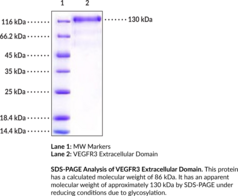Territorial Availability: Available through Bertin Technologies only in France
- Correlated keywords
- HEK 293 Tyr 25 Arg 472 Ser 473 VEGFC VEGFD VEGFR 2 NP_002011.2 3 4 FLT
- Product Overview:
VEGFR3 is a receptor tyrosine kinase that is composed of an N-terminal extracellular ligand-binding domain, which contains seven immunoglobulin-like (Ig-like) domains, a transmembrane domain, and an intracellular tyrosine kinase domain, which is subject to phosphorylation and contains a kinase insert domain and the C-terminal domain.{60406,60405} It contains an N-terminal signal peptide cleavage site at Tyr25 and can also be cleaved between Arg472 and Ser473 creating an alternate N-terminus.{61388,61389} VEGFR3 forms homodimers or heterodimers with VEGFR2, with heterodimerization inducing changes in VEGFR3 autophosphorylation patterns.{60405} It is expressed in lymphatic endothelial cells, where it is bound by the growth factors VEGF-C or VEGF-D and involved in cell proliferation, migration, and survival, as well as in cells undergoing angiogenesis or lymphangiogenesis, and in osteoblasts, neuronal progenitor cells, and macrophages.{60405,60406} Inactivating mutations in VEGFR3 have been found in patients with hereditary lymphedema.{60410,60411} Activation of VEGFR3 signaling increases tumor growth in a mouse orthotopic model of colorectal cancer, and VEGFR3 protein levels are increased in tumor tissue and tumor-associated macrophages isolated from patients with non-metastatic colorectal cancer.{60412} Cayman’s VEGFR3 Extracellular Domain (human, recombinant) protein can be used for enzyme activity assays. This protein consists of 763 amino acids, has a calculated molecular weight of 86 kDa, and a predicted N-terminus of Tyr25 after signal peptide cleavage. By SDS-PAGE, under non-reducing conditions, the apparent molecular mass of the protein is approximately 130 kDa due to glycosylation.
Cayman Chemical’s mission is to help make research possible by supplying scientists worldwide with the basic research tools necessary for advancing human and animal health. Our utmost commitment to healthcare researchers is to offer the highest quality products with an affordable pricing policy.
Our scientists are experts in the synthesis, purification, and characterization of biochemicals ranging from small drug-like heterocycles to complex biolipids, fatty acids, and many others. We are also highly skilled in all aspects of assay and antibody development, protein expression, crystallization, and structure determination.
Over the past thirty years, Cayman developed a deep knowledge base in lipid biochemistry, including research involving the arachidonic acid cascade, inositol phosphates, and cannabinoids. This knowledge enabled the production of reagents of exceptional quality for cancer, oxidative injury, epigenetics, neuroscience, inflammation, metabolism, and many additional lines of research.
Our organic and analytical chemists specialize in the rapid development of manufacturing processes and analytical methods to carry out clinical and commercial GMP-API production. Pre-clinical drug discovery efforts are currently underway in the areas of bone restoration and repair, muscular dystrophy, oncology, and inflammation. A separate group of Ph.D.-level scientists are dedicated to offering Hit-to-Lead Discovery and Profiling Services for epigenetic targets. Our knowledgeable chemists can be contracted to perform complete sample analysis for analytes measured by the majority of our assays. We also offer a wide range of analytical services using LC-MS/MS, HPLC, GC, and many other techniques.
Accreditations
ISO/IEC 17025:2005
ISO Guide 34:2009
Cayman is a leader in the field of emerging drugs of abuse, providing high-purity Schedule I-V Controlled Substances to federally-licensed laboratories and qualified academic research institutions for forensic analyses. We are certified by ACLASS Accreditation Services with dual accreditation to ISO/IEC 17025:2005 and ISO Guide 34:2009.





